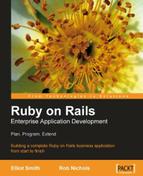Within this book, we hope to have provided you with the information you need to move from Rails novice to confident small business application developer. By considering the development environment as a whole, rather than code in isolation, we have described not only how to put an application together, but also how to bring together all the parts that are required to build a working solution.
One may wish to spend as much time as possible writing good Rails code, but successful application development cannot be carried out in a bubble. At some point, it must integrate with its environment. To do so in a Rails environment, the application must work well on the platform hosting it. Data needs to be retrieved from databases efficiently, processed, and handed on to web servers. As this reliance on other systems is so important to the final product, we have taken time to describe how to set up the environment, and most importantly the integration between services.
Like most people, we like an easy life. In development that means making use of the tools available to simplify the job. It means, using an integrated development environment that simplifies and helps organize the creation and editing of code. Just as important is having a source control system that reliably and simply stores version information to facilitate backup and collaboration. Therefore, these topics have also been covered.
In this final chapter, we have moved beyond Rails by considering the skills one can use to broaden a developer's skill set. we have also, in the clichéd language of business, considered applications as solutions to business problems, rather than simply collections of code. In this, we hope we have highlighted that there is more to writing successful applications than good coding skills. The applications have to work well, but they also need to satisfy a businesses requirement.
However, as important as all of the above is, there is one overriding message that we hope this book passes on:
It provides the tools to build scalable, easily maintained applications that are simple to distribute throughout a business. The code is flexible and can be transferred to many different environments. Its structure is portable and easy to back up. Most importantly, it does so many of the routine tasks for the developer that they are left to concentrate on the parts of the application that matter. That is, the unique attributes that will allow each application to closely match the requirements of the project that spawned it.
Ruby on Rails has provided us with the tools to most efficiently fill our working days building small business applications; a task we get great satisfaction from. Our hope is that the contents of this book helps you gain as much satisfaction from using this excellent framework to solve the problems that arise within the businesses you work for and with.
